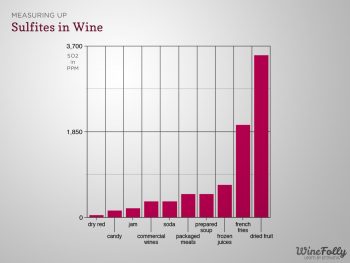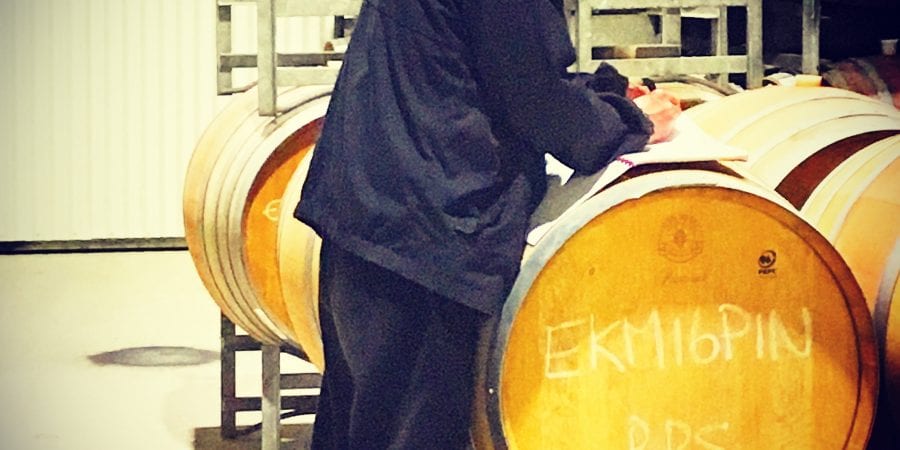This week, I’m delving into a controversial topic.
So, consider yourself warned!
Over the years at the Cellar Bar, I’ve heard this a handful of times…
“I can’t drink red wine because the sulphur gives me a headache”
I’m just going to put it out there and say… sorry, but that’s not a thing. And I have science to back me up!
Yes, absolutely, a small percentage of our population (it’s thought to be around 1%) do have allergic reactions to sulphites in food and wine (and by the way, there are way more sulphites in processed foods than in a glass of red wine… check out this table from our friends at Wine Folly).

Sulfite reactions normally affect breathing, but some people with sensitivity have skin reactions, such as hives or even digestive problems, such as abdominal pain or diarrhoea.
But NOT headaches.
Before I go on (and offend more people!), let’s just quickly revisit why we put sulphur in wine…
So, what’s the story with sulphur dioxide?
Sulphur dioxide has been used in winemaking for many years. There is talk of the Egyptians and Romans using it, but there hasn’t been any conclusive proof of that.
Sulphur dioxide is a unique compound which inhibits microbial activity and aids in preventing oxidation and therefore is commonly used for maintaining the wine in prime condition.
It can be added to the bins in which the grapes are harvested and transported to the winery, to the juice prior to fermentation and, most commonly, to the wine after fermentation and during storage.
Sulphur dioxide is added in very small amounts and is considered harmless to most consumers. It is important to remember that sulphur dioxide is actually naturally produced by yeast during the fermentation process. Therefore, some sulphur dioxide will be present in all wines even if it has not been added.
Back to the headache thing…
For most of us, the cause of a wine headache is simply drinking too much wine and not enough water (I think we’ve all been there!).
The simple solution here is to always be conscious of how much alcohol you consume and always stay hydrated.
However, for a small section of our population, headaches from wine can occur even when we don’t drink a lot. So, if it’s not sulphur, what does cause these kinds of headaches and how can they be avoided?
Tannins
Tannins are naturally occurring compounds found in grape skins, seed and stems. For most of us, tannins create no headache at all. In fact, they are a great source of antioxidants.
But, if you seem to get headaches more often when you drink red wine, there is a chance you have a sensitivity to tannins.
You can test this yourself by brewing a cup of black tea for 5 or 10 minutes longer than it suggests on the pack. If you get a headache after you drink that, then there’s a good possibility that you are susceptible to tannins. In that case, just avoid red wines (or drink red wine low in tannins like Pinot Noir and Grenache) and you should be fine!
Histamines
Histamines are chemicals that are released when we have an allergic reaction and can cause symptoms such as a runny nose, dry eyes and a headache.
Recent research has found that food and drinks that have been aged, such as dry-aged meats and red wines, can cause our body to release histamines and create these allergy-type symptoms.
To prevent a histamine headache, simply take an anti-histamine prior to having a glass of red wine! (of course, check the label before you mix any medication with alcohol!!)
Sugar
Alcohol and sugar are two substances that when combined can create a powerful headache. When your body consumes alcohol or sugar, you need lots of water in order to help process the substances. If you are not well-hydrated, your body starts to pull the necessary water it needs from other parts or your body, including your head.
To prevent this problem, avoid sweet dessert wines and white wines labeled semi-dry or sweet.
What else?
Well, I’m so glad you asked, because I recently came across this article…
If you’re not up for reading the whole thing, the general gist is this…
While sulphites have been blamed for causing reactions in some wine drinkers in the past, there is evidence to suggest that bottlings made without added sulfites might be more apt to generate headaches!
They say that a group of compounds called biogenic amines (BA). BAs are present in all fermented food and drink and increase with food spoilage.
So, there you go…!

Thank you. I think you should be on myth busters!
Hope you, the family and all of your staff have a wonderful Christmas and an even better 2022
Thanks Simon! Merry Christmas to you too 🙂
Excellent article! More wine for my men, we ride at dawn!